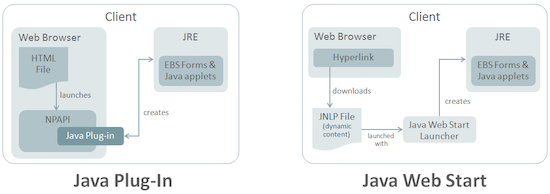Java Web Start (JWS) is now available for Oracle E-Business Suite 12.1 and 12.2:
- Using Java Web Start with Oracle E-Business Suite (Note 2188898.1)
What is Java Web Start?
Java Web Start launches E-Business Suite Java-based functionality as Java Web Start applications instead of as applets. Java Web Start is part of the Java Runtime Environment (JRE).
Does EBS use Java on desktop clients?
Yes. The E-Business Suite requires Oracle Forms. Oracle Forms requires Java.
Other EBS products also have functionality that require Java.
What is the new approach with Java Web Start?It’s not technically “new” (it is a mature Java technology originally released in 2004), but we’re using it for the first time with the E-Business Suite. This approach launches EBS Forms-based screens and other functionality as Java Web Start applications instead of as applets.
What prerequisites are needed for Java Web Start?
| Oracle E-Business Suite Release | Minimum JRE Release |
| 12.2 | JRE 8 Update 121 b33 |
| 12.1.3 | JRE 8 Update 121 b33 |
A small number of server-side patches for Forms and EBS are needed. See:
- Using Java Web Start with Oracle E-Business Suite (Note 2188898.1)
Why is this important?
Until now, E-Business Suite’s Java-based content required a browser that supports Netscape Plug-in Application Programming Interface (NPAPI) plug-ins.
Some browsers are phasing out NPAPI plug-in support. Some browsers were released without NPAPI plug-in support. This prevents the Java plug-in from working.
With the release of Java Web Start, E-Business Suite 12.1 and 12.2 users can launch Java-based content (e.g. Oracle Forms) from browsers that do not support Java plug-ins via NPAPI. Java Web Start in EBS works with:
- Microsoft Internet Explorer
- Microsoft Edge
- Firefox Rapid Release (32-bit and 64-bit)
- Firefox Extended Support Release (32-bit and 64-bit)
- Google Chrome
How does the technology architecture change?
Java Web Start changes the way that Java runs on end-users’ computers but this technical change is generally invisible to end-users.
Java Web Start applications are launched from browsers using the Java Network Launching Protocol (JNLP).

Will the end-user’s experience change?
Generally not. We have worked hard to ensure that your end-users’ experience with Java Web Start applications is as similar as possible to applets via the Java browser plugin. The differences between the Java Plug-in and Java Web Start are expected to be almost-invisible to end-users.
Will E-Business Suite still require Java in the future?
Yes. It is expected that our ongoing use of Oracle Forms for high-volume professional users of the E-Business Suite means that EBS will continue to require Java. We replicate, simplify, or migrate selected Forms-based flows to OA Framework-based (i.e. web-based HTML) equivalents with every EBS update, but Oracle Forms is expected to continue to be part of the E-Business Suite technology stack for the foreseeable future.
Does the E-Business Suite have other Java applet dependencies?
Yes. In addition to Oracle Forms, various E-Business Suite products have functionality that runs as Java applets. These Java applets require browsers that offer plugin support. These products include applets:
- Oracle General Ledger (GL): Account Hierarchy Manager
- Oracle Customers Online (IMC): Party Relationships
- Oracle Call Center Technology (CCT)
- Oracle Sourcing (PON): Auction Monitor
- Oracle Installed Base (CSI): Visualizer
- Oracle Process Manufacturing (OPM): Recipe Designer
- Oracle Advanced Supply Chain Planning (MSC): Plan Editor (PS/SNO)
- Workflow (WF): Status Diagram, Notification Signing with Digital Signatures
- Scripting (IES): Script Author
What is the roadmap for browser support for plug-ins?
Plug-in support has various names, including:
- Browser Helper Objects (BHO) by Microsoft
- Netscape Plugin Application Programming Interface (NPAPI) plugins by Mozilla and Google
- Internet plug-ins by Apple
This article will simply use the term “plug-in support,” which refers to all of the different types listed above.
Some browsers are phasing out plug-in support. Some browsers were never released with plug-in support.
Some organizations may wish to use browsers that do not offer plugin support. The Java Web Start approach works with all browsers, regardless of whether they have plugin support.
What is the roadmap for Java’s support for plug-ins?The Java team recently published their plans
for removing the Java browser plugin in a future version of Java. The announcement states (highlighted for emphasis):
Oracle plans to deprecate the Java browser plugin in JDK 9. This technology will be removed from the Oracle JDK and JRE in a future Java SE release.
What does “deprecate” mean?
In this context, “deprecate” means there will still be a Java Plug-in in JRE 9.
In other words, JRE 9 will include the Java Browser Plug-in and Java Web Start. Users will still be able to run Java-based applications using the Java Plug-in and Java Web Start in JRE 9.
What does this mean for E-Business Suite users running the Java Plug-in with JRE 9?
The release of Java 9 is not expected to affect E-Business Suite users.
JRE 9 is expected to continue to work with the E-Business Suite in browsers that support the Java Browser Plug-in via the NPAPI protocol.
JRE 9 is expected to work with the E-Business Suite in browsers that support Java Web Start.
What browsers are expected to support the JRE 9 plug-in?
Internet Explorer, Firefox ESR 32-bit, and Safari are expected continue to support NPAPI — and, therefore, Java and Forms.Firefox Rapid Release, Firefox ESR 64-bit, Google Chrome, and Microsoft Edge do not support NPAPI, so Java-based apps cannot run in those browsers using the Java Plug-in. EBS users can run Java-based content using Java Web Start with JRE 9.
What are the timelines for browsers’ plugin support?Individual browser vendors have been updating their plans regularly. Here’s a snapshot of what some browser vendors have stated as of today:
Microsoft Internet Explorer (IE)
Microsoft has indicated that they intend to continue to offer plug-in support in IE.
Microsoft Edge
Microsoft Edge was released in Windows 10 without Browser Helper Object (BHO, aka. plugin) support. Microsoft has no plans to add plugin support to Edge.
Mozilla Firefox Extended Support Release (ESR)
Mozilla indicated in early 2016 that Firefox ESR 52 32-bit will be the last version to offer NPAPI (and JRE) support. Firefox ESR 52 32-bit was released in March 2017 and will be supported until May 2018.
Mozilla removed NPAPI support from Firefox ESR 52 64-bit in March 2017.
Mozilla Firefox Rapid Release
Mozilla removed NPAPI support from the Firefox 52 Rapid Release version in March 2017.
Apple Safari for macOS
Safari offers Internet plug-in support for macOS users. Apple has not made any statements about deprecating plugin support for macOS users.
Google Chrome for Windows
Chrome offered support for plugins until version 45, released in September 2015. They removed NPAPI support in later Chrome releases.
Will I need to change browsers for EBS 12.1 or 12.2?
Not generally, but it depends on your choice of browsers and whether you wish to use Java Plug-in or Java Web Start.
Here’s the compatibility matrix for EBS 12.1 and 12.2 certified combinations:
| Java Plug-In | Java Web Start | |
| Microsoft Internet Explorer | Yes | Yes |
| Microsoft Edge | Yes | |
| Firefox Rapid Release 32-bit | See Note 1 | |
| Firefox Rapid Release 64-bit | See Note 1 | |
| Firefox Extended Support Release 32-bit | Yes | Yes |
| Firefox Extended Support Release 64-bit | Yes | |
| Google Chrome | Yes | |
| Safari on macOS | Yes | See Note 2 |
Note 1: Expected to work but not tested.
New personal versions of Firefox on the Rapid Release channel are released roughly every six weeks. It is impractical for us to certify these new personal Rapid Release versions of Firefox with the Oracle E-Business Suite because a given Firefox release is generally obsolete by the time we complete the certification.
From Firefox 10 and onwards, Oracle E-Business Suite is certified only with selected Firefox Extended Support Release versions. Oracle has no current plans to certify new Firefox personal releases on the Rapid Release channel with the E-Business Suite.
Note 2: Not certified.
Apple changed the Gatekeeper permissions in macOS Sierra 10.12. These changes prevent JNLP execution, making the Java Web Start user experience very challenging. We are investigating options right now.
Will Oracle release its own browser for the E-Business Suite?
No. Long-time Oracle users may remember the Oracle PowerBrowser. The industry has since moved away from software that requires proprietary browsers. We have no plans to release a browser specifically for E-Business Suite users.
Will this work on Android or iOS?
No. Neither of these operating systems are compatible with Java.
E-Business Suite users who need to run Oracle Forms-based content or other Java-based functionality should use Windows or macOS.
Will Java Web Start be mandatory?
Not immediately. It is expected that the use of Java Web Start will be optional at least up to, and including, Java 9, which may be the last Java release to include the JRE browser plugin.
Will Java Web Start coexist with JRE?
Yes. You can have a mixed environment where some end-users launch Java Web Start applications, while others use applets via the Java plug-in. This mixed group of end-users can connect to the same E-Business Suite environment.
EBS system administrators have full server-side control over these choices.
Will this affect EBS customizations?
Maybe. It depends upon which of the following apply to your environment:
- Scenario 1: You have modified standard EBS screens running in Forms:
No actions needed. These customizations are expected to work with Java Web Start without any additional changes.
- Scenario 2: You have built custom Java applets of your own to extend the E-Business Suite: These will continue to run with the Java plug-in, but you may wish to update those applets to use Java Web Start.
- Scenario 3: You have third-party extensions or products that depend upon the Java plug-in:
These will continue to run with the Java plug-in but you may wish to contact your third-party vendor for details about their plans for Java Web Start.
Are there any additional licensing costs?
No. Java Web Start is included with EBS licenses and does not introduce any new licensing costs.
Related Articles
Disclaimer
The preceding is intended to outline our general product direction. It is intended for information purposes only, and may not be incorporated into any contract. It is not a commitment to deliver any material, code, or functionality, and should not be relied upon in making purchasing decision. The development, release, and timing of any features or functionality described for Oracle’s products remains at the sole discretion of Oracle.
